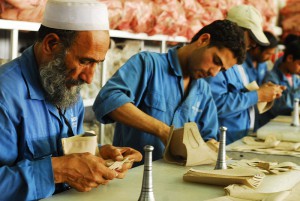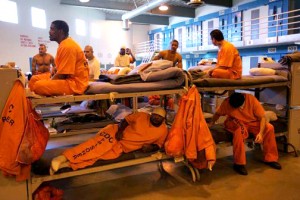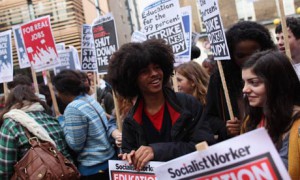 There is a fairly widespread argument concerning the working class that goes something like this:
There is a fairly widespread argument concerning the working class that goes something like this:
The Working class is now only a small fragment of the population. The old class politics is therefore permanently dead and can not be resuscitated. Instead we need a focus on freeing the expression of various groups and protecting the most vulnerable in society. These include many different groups of which the working class is only part of this vulnerable section.
The first part about the working class no longer existing, I have for a long time found a fascinating subject. That this view is almost invariably given to me by people who sell their labour power in the market in order to subsist, causes me to shake my head in a mixture of confusion, horror and amusement.
However, the viewpoint is in fact consistent because people are not talking about the working class in terms of its social role in reproducing capitalist society. They are talking about it in terms of identity.
 Once class is reduced to an identity – burly white men in blue uniforms – then all of the rest actually follows quite naturally. While this viewpoint is incredibly common, in fact, one need not even go this far. One can simply say that the problem that we need to overcome is oppression. Since oppression manifests in many different ways, we need to take them all equally seriously and not try to promote some primacy of oppression – which itself should be viewed as an attempt at reproducing domination. From thence the identity arises implicitly from the fact of being oppressed.
Once class is reduced to an identity – burly white men in blue uniforms – then all of the rest actually follows quite naturally. While this viewpoint is incredibly common, in fact, one need not even go this far. One can simply say that the problem that we need to overcome is oppression. Since oppression manifests in many different ways, we need to take them all equally seriously and not try to promote some primacy of oppression – which itself should be viewed as an attempt at reproducing domination. From thence the identity arises implicitly from the fact of being oppressed.
Now, it’s absolutely true that many people no longer identify as working class. There are those that do, and many of them really are burly white men in blue uniforms. But what was the original reason for proposing a class politics in the first place? Was it some attempt to ignore the various identities and to continue the subjugation of the oppressed of different identities?
The original reason for class politics appears to have drifted off into the mists of obscurity. The public can hardly be blamed considering that virtually nobody of the current generation has ever heard why. Many anarchists and a surprisingly large number of Leninists can no longer say what the reason for it was!
Though it sounds alien to modern ears, nay pretentious, the original reason the working class became the focus of socialist politics arose out of an attempt at a scientific socialism.
The idea was basically that rather than crying out about injustice, or bearing witness to atrocity, or demanding the impossible we should actually try to find out what regularities in history might give us a clue about how we can form a strategy for demolishing the present order of society in favour of one which could produce the maximum of human development.
The hatred of oppression has no beginning in human history for surely it’s been a feature of human life since the first injustice was experienced. From this urge to fight against the systematic domination by aristocracies and empires, we have for millennia seen the resurgence of philosophies against oppression, often times occurring in the form of the communist idea – that land and property should be held in common for the benefit of all.
For the vast majority of history this impulse has expressed itself religiously, in virtually every religion of the world from Zhuangzi in Taoism through Abū Dhar al-Ghifari al-Kinani’s Islam.
It is only natural to express things religiously in the context of a society which itself is defined religiously. However, the religious approach to these questions is very often divorced from a careful analysis of the reasons for which they arise.
Now that we have entered into the scientific era, we have the tools at our disposal to take a more structural and serious look at what would be required for transformation to take place. We could use our understandings of the material world and history to put together a science: historical materialism, which could shed light on how we might undertake the reconstruction of society on more favourable terms.
It was from this standpoint, the scientific standpoint, that the working class was suggested as the group which had the best chances of creating a new social order; it was not because they all immediately knew they were working class or shared an identity.
The crux of the argument relies on an Historical Materialist analysis. Basically, the cultural sphere and how it manifests is directly dependent on the social relations of production and the forces of production which underlie those.
Without changing the social relations of production there are very extreme limitations on what one can change. The changeable is restricted to that which is compatible with the current social relations of production.
In capitalism, the working class fills the social role of those who sell their labour power in production. Marx saw that this group was ever increasing as the populations moved to urban centres, and the capitalist mode began to supplant the peasant producer, cottage industries and small producers in favour of production of goods for exchange by firms.
The hypothesis was that because the working class would become most numerous, and is capable of running all of production already, if it could only come into a conscious understanding of its potential power as a class it could use this power to radically change society in an egalitarian direction.
The theory had nothing to do with the working class knowing this automatically, although some groups of socialists, perhaps most notably Bakunin, but also a young Trotsky, have definitely believed this to be true. It instead called for a large project of construction of a movement based on the objective capacity of a group of people to exert their social power in a manner that could be tremendously emancipatory.
Now, one could argue whether or not this is true, and one could do so best by also making use of facts and figures regarding the changing nature of the capitalist economy. But whatever one thinks about this hypothesis, it should be realised that it is an hypothesis about how we can change the structure of society based on an analysis of the root of power in society.
Waiting Forever
The revolutionary socialists of a certain stripe – especially those which do not see that a transition period will be necessary – have come into a particular bind with regards to identity politics. The problem is that the revolution, positing the overturning of all of the social order at some future date, is so ruptural and punctuated that the question of primacy of the economic factors is pulled into question.
Why should the economic not be changed precisely at the same time during the rupture as every other type of oppression? The dynamic of social change is compressed so completely into a singularity that indeed the revolutionary generally ends up falling on one or the other side of the problem:
- Either the working class is more important – in which case one is assuming the frame of a domination of working class identity.
- One takes all oppressions as intersectional and of essentially equal importance in analysis.
This viewpoint also calls into question any specific orientation strategically towards obtaining economic power, as this is just another dimension.
Since even revolutionaries need to be actively engaging with the working class preparing for the revolution, historically this has meant building at least to some extent in the unions (although they’ve always been quite a bit worse at this than groups like the Official Communists of the third international who take a longer view – but this is another story). This made some sense within the framework of building economic power to take control of the means of production when the revolution occurs. But if this is just another dimension the groups may as well involve themselves with any other activity.
The end outcome of this is that the socialists have become absolutely penetrated by the idea that socialist politics is about tailing around liberal causes of any sort because they are morally correct with no assessment of what power would be necessary to make decisive improvements which would build a movement to eliminate the current power structure. One need only look at the UK to see how corrosive such viewpoints have been on socialist organisations.
A Brief Analysis of Racism
 In the US, anti-African American racism, arose out of the slave economy. The emancipation of slaves was followed by the entrance of African Americans into the ranks of the working class but only slowly and with many cultural features of the period of the slave economy holding over for generations.
In the US, anti-African American racism, arose out of the slave economy. The emancipation of slaves was followed by the entrance of African Americans into the ranks of the working class but only slowly and with many cultural features of the period of the slave economy holding over for generations.
The combination of old cultural attitudes which arose under the slave economy as part of its superstructure, was combined with the very low social mobility of those who do not have social networks of peers with access, and further strengthened by the lack of class mobility in general, has meant that the African American population is overwhelmingly confined to the working class and below. In fact the African American population in large number is unable even to play a role as working class and are largely divorced from the ability to sell their labour power.
What types of changes would be necessary to change this system of affairs? Many people on the left are liable to spend quite a lot of time talking about racism, racist concepts and racist language – combating racism in our communities etc.
But the origins of this racism are due to the materiality of the confinement of African Americans in an underclass due both to lagging cultural features in the superstructure which are quite consonant with their inability to obtain real social power and the lack of access to any independent means.
What would be required to change this state of affairs? Well, if African Americans were given a massive generational redistribution to enter into the ranks of the ruling class then racism would probably be significantly reduced while still under capitalism.
Should we take each oppressed group and spread it out through the social strata as it is currently conceived? Some liberal anti-racists and feminists have indeed proposed that this is the best solution, especially since we are so often told that there is no other possible solution.
However, even within this framework one has to ask who the social actor is who would achieve this. What social force could be mobilised to force a ruling class penetration by some selection of African Americans? Could the African American community obtain such a thing out of its own social power – one which includes unbelievable amounts of violent police repression, incarceration, mass unemployment and very few avenues for the dissemination of ideas.
If not, then some other group would have to work in their interests. And from this viewpoint comes the idea of “helping the most vulnerable”, as clearly the most vulnerable do not have the social power to act in their interests.
Yet neither do the majority of people who take the viewpoint that they must help the most vulnerable! That power is overwhelmingly held by the very rich – those who we sell our labour to, those who control the media stations and promote the system which allows them to exist as an aristocracy.
Our Movement
 The problem has been posed incorrectly because it has been posed on the basis of a moral orientation rather than a strategic one. It is essentially the same orientation of the early christian communists during the Roman era. It seeks a justice, but is unable to look dispassionately at what would be necessary to obtain it.
The problem has been posed incorrectly because it has been posed on the basis of a moral orientation rather than a strategic one. It is essentially the same orientation of the early christian communists during the Roman era. It seeks a justice, but is unable to look dispassionately at what would be necessary to obtain it.
The task of obtaining an egalitarian society which sheds much of its oppressive apparatus must look to organise the public in an oppositional movement which is itself egalitarian but can obtain the economic power and divest the ruling class of the power it holds. I believe that it is still the working class constituency from whom we should draw this movement as it is the most capable of performing this feat as it is the most broad and the most capable of running production. The greater the proportion of the working class which becomes involved and the more they see themselves as a class the more effective we will be.
This does not in any way mean that we ignore racism, sexism, homophobia or any other problem in our movements. Indeed, far from calling for people to “wait until the revolution” these things should be immediately considered to be unacceptable within the movement itself. It’s useful to ask what precisely would enable the most full participation of the working class regardless of background in a movement.
However, we should not pretend to an agency to overturn these facts in the greater social structure without a movement devoted to taking control of the underlying productive mechanism which allows society to reproduce itself. Until we begin to obtain control over the productive sphere we will never be able to have real meaningful control over the cultural sphere.










